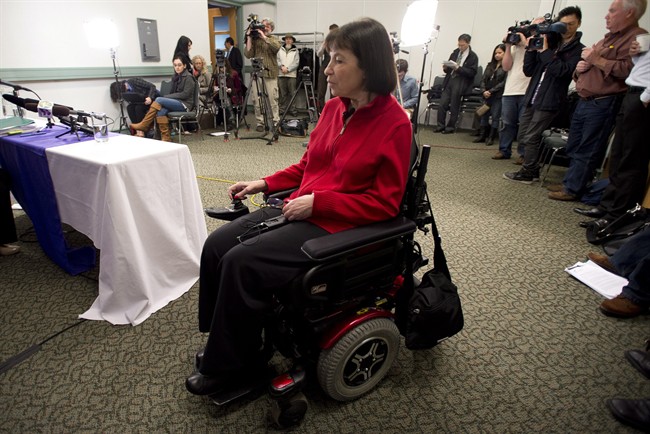VANCOUVER – The civil rights group behind a landmark case that is expected to see the Supreme Court of Canada wrestle again with the contentious issue of doctor-assisted suicide is asking the country’s highest court to fast-track what it says is a matter of “extreme urgency.”

The B.C. Civil Liberties Association has filed a notice with the Supreme Court of Canada, asking it to hear an appeal of an earlier decision that upheld the law and to ensure the case is expedited.
It’s the latest development in a case that has stretched on for more than two years, with the B.C. Supreme Court initially overturning the law and the B.C. Court of Appeal re-instating it in a decision released earlier this month.
Grace Pastine, a lawyer with the association, said the Supreme Court of Canada shouldn’t allow the case to drag on any longer than necessary.
“This is a matter of extreme urgency,” Pastine said Tuesday at a news conference in Vancouver.
“The fate of gravely ill Canadians hangs in the balance. … For those who are suffering at the end of life, justice delayed is justice denied.”
Pastine said it’s unusual, but not unheard of, for the Supreme Court of Canada to agree to speed up a case. It’s not clear when the court will decide whether to hear the case or, if it does, whether to hear if it more quickly than usual.
The case began in 2011, when the B.C. Civil Liberties Association and several other plaintiffs, including ALS patient Gloria Taylor, filed a lawsuit alleging the bans on assisted suicide and euthanasia violate the charter.
Last year, a B.C. Supreme Court judge ruled the law is unconstitutional and gave Parliament a year to rewrite it. The court also granted Taylor an immediate exemption from the law, though she died last fall without the help of a doctor.
The federal government appealed, and this month the B.C. Court of Appeal released a split decision that concluded a 1993 ruling by the Supreme Court of Canada involving Sue Rodriguez was binding and the trial judge had no authority to overturn it.
Throughout the process, observers predicted the case would ultimately end up at the high court, particularly because the federal government has indicated it has no interest in revisiting the issue on its own.
“We believe the Supreme Court of Canada is the only place that seriously ill Canadians can have their constitutional rights protected,” said Pastine.
The plaintiffs in the case included Taylor; the family of Kay Carter, a B.C. woman who travelled to Switzerland in 2010 to end her life with the help of a doctor; and a physician from Victoria who said he would be willing to help patients die.
The case also saw a handful of Canadians with terminal or debilitating illnesses tell their stories, including Elayne Shapray, a 67-year-old woman from Vancouver whose multiple sclerosis has left her unable to walk and requiring full-time care to perform even the most basic tasks.
Shapray, a former nurse who has two grown children and four grandchildren, has filed a new affidavit to support the B.C. Civil Liberties Association’s application to expedite their appeal.
She told Tuesday’s news conference that if the ban on assisted suicide is upheld, she will be forced to consider taking matters into her own hands before her health deteriorates even further.
“I am essentially a prisoner in my own body,” said Shapray, sitting in a wheelchair and speaking in a voice that, at times, was reduced to a whisper.
“My MS now impacts my quality of life to the point where I no longer consider my life worth living unless I also possess the means to leave it at the time of my choosing.”
The Supreme Court of Canada last dealt with the issue of assisted suicide in 1993 in a case filed by Sue Rodriguez, who, like Gloria Taylor, suffered from ALS, also known as Lou Gehrig’s disease.
Rodriguez argued the law violated her charter rights, but the court ruled those complaints were outweighed by the need to protect vulnerable people and promote the sanctity of life.
Despite the decision, Rodriguez died with the help of a doctor the following year.



Comments